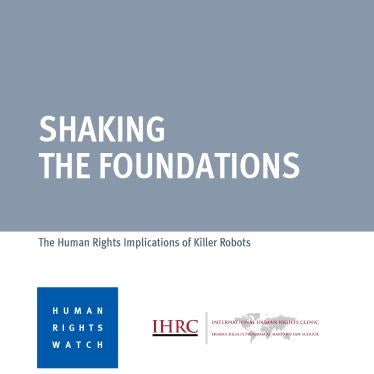Update:
In a statement issued earlier today, Human Rights Watch criticized a statement made at the US State Department's daily briefing saying that the Obama administration had completed its policy review on antipersonnel landmines and decided not to join the international treaty banning these weapons. The Obama administration has subsequently corrected its initial statement, and indicated that its policy review is continuing. Human Rights Watch welcomes this correction and urges the United States to join the 158 countries - including nearly all its treaty allies - that have signed the landmine treaty.
(Washington, DC) - The Obama administration's decision to continue the Bush administration's policy of refusing to join the international treaty banning antipersonnel landmines is a reprehensible rejection of the most successful disarmament and humanitarian treaty of the past decade, Human Rights Watch said today.
"President Obama's decision to cling to antipersonnel mines keeps the US on the wrong side of history and the wrong side of humanity," said Steve Goose, Arms Division director at Human Rights Watch. "This decision lacks vision, compassion, and basic common sense, and contradicts the Obama administration's professed emphasis on multilateralism, disarmament, and humanitarian affairs," said Goose.
The 1997 Mine Ban Treaty has been endorsed by 158 countries, including nearly all of the US military allies. Every other member of NATO has endorsed the treaty, as has every other country in the Western Hemisphere except Cuba. The international stigma against the weapon has become so strong that in recent years the only government laying significant numbers of new landmines has been the abusive military government in Burma. Production of the weapon has dwindled to a few states, and virtually no government still exports antipersonnel mines.
The United States has not used antipersonnel mines since 1991, has not exported them since 1992, has not produced them since 1997, and has no plans for future procurement. President Bill Clinton was the first world leader to call for the eventual elimination of all antipersonnel mines, in 1994. While his administration did not sign the Mine Ban Treaty after it was negotiated in 1997, it set the goal of joining in 2006. President George W. Bush abandoned that approach and said in 2004 that the US would never join.
Some US officials have cited the ongoing conflicts in Afghanistan and Iraq as reasons for not joining the treaty. However, the United States has never used antipersonnel mines in those conflicts - or anywhere else in the past 18 years. Moreover, both Afghanistan and Iraq are parties to the Mine Ban Treaty and have comprehensively banned any use or even possession of the weapon. Those two countries, and the other coalition partners that are parties to the treaty, would violate the treaty if they assisted the US in any way with the use of antipersonnel mines.
News that the Obama administration had conducted a review of its landmines policy and decided not to join the Mine Ban Treaty was conveyed at the State Department's daily briefing on November 24, 2009, in response to a question about landmines. Human Rights Watch said that the decision came as a shock even to those closely following the issue.
The administration had not disclosed that a review was under way, despite repeated calls for a formal review from Human Rights Watch, other nongovernmental organizations, and congressional leaders on the issue such as Senator Patrick Leahy.
"This was a stealth review, conducted in complete secrecy," Goose said. "We can only conclude that this was very hasty and cursory. It's a black eye for an administration that supposedly prides itself on transparency."
It does not appear that in making its decision, the US made any effort to consult meaningfully with outside experts, knowledgeable organizations or institutions, or perhaps even more disturbing, with relevant legislators or foreign allies, Human Rights Watch said. There has yet to be an official announcement regarding the review, its outcome, or the reasons for its conclusions. State Department officials indicated that there is no intention to make the detailed findings of the review public.
The administration apparently rushed to a decision in advance of the Second Five-Year Review Conference of the Mine Ban Treaty, to be held in Cartagena, Colombia from November 29 to December 4. The US will attend the event, also known as the Cartagena Summit on a Mine-Free World, as an observer, the first time it has officially participated in a formal Mine Ban Treaty meeting.
"The positive aspects of the US participating in a major Mine Ban Treaty meeting will be completely overshadowed by its misguided decision to remain the only country in the world to proclaim that it will never join the treaty," Goose said.
Human Rights Watch is one of the founders of the International Campaign to Ban Landmines, which received the Nobel Peace Prize in 1997, in large part for its role in bringing about the Mine Ban Treaty.
"It is painful that President Obama has chosen to reject the Mine Ban Treaty just weeks before he joins the ranks of Nobel peace laureates, including the ICBL," said Goose.






